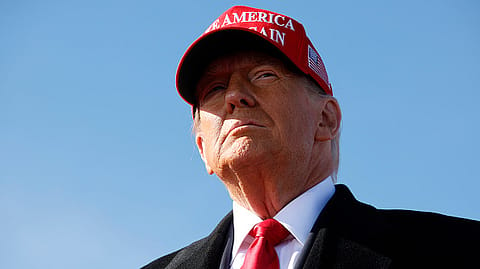The significance of Donald Trump's slogan and silence
The 47th US President's speech on January 20 has provided crucial clues to India on how to deal with its biggest trading partner.

As the world tries to understand the implications of the policy priorities of the 47th US President Donald Trump, his inaugural speech on January 20 has given two crucial clues for India on how to deal with its biggest trade partner. One hint was evident from what he said, and the other, from what he did not say.
The first one, the slogan, “drill baby drill”, is self-explanatory. It tells of the importance the new President of the world’s largest economy is going to give to the American oil and gas industry. He wants the country to pump out more oil and natural gas to feed its industry, and also become a major supplier of fossil fuels to import-dependent countries like India. The second hint has come in the form of his decision not to talk about the much anticipated “tariffs” on goods imported from China to the US. Going by Trump’s rhetoric during the election campaign, there was a general expectation that Trump may declare a tariff war on China on the very first day of taking charge as US President for a second term after a gap of four years. His first term had seen tariff hikes and visible efforts to reduce US dependency on Chinese goods. That did not happen. Instead, he has indicated that he might take a non-confrontational approach towards the leader in global trade, provided China is willing to address his concerns. India, which had expected the China+1 strategy of global corporations to see some of the export opportunities to the US shift from China to India in the wake of a US-China trade war, will now have to redraw its manufacturing export plans.
OIL DIPLOMACY
With 249 million tonnes of crude oil consumption in 2023, India is the third-largest oil-consuming country after the US and China. With 827.1 million tonnes of crude oil production in 2023, the US was the largest producer of crude oil in the world. Russia and Saudi Arabia were the second and third-largest oil-producing countries that year. However, in value terms, India’s crude oil imports from the US were less than those from Russia and Saudi Arabia (in 2023-24). Any significant increase in crude oil surplus in the US will thus be an attractive commodity to import for India. It will not require any major policy shift from India’s side as petroleum product imports from the US to India have been gradually increasing over the years. If India imported $1.3 billion worth of petroleum products from the US in 2015-16, that number had increased to $12.96 billion in 2023-24, with record imports worth $18 billion in the previous year (2022-23).
Incidentally, a major increase in petroleum product imports from the US to India will address the main concern of Trump in India-US trade—a persistent trade deficit in favour of India. In the current fiscal (April-November), India exported $52.9 billion worth of goods to the US and imported $29.6 billion worth of goods from that country with a trade surplus of $23.3 billion for India. For the whole of 2023-24, the trade surplus was $35.3 billion. Bilateral trade has been becoming more balanced in recent years, especially if you consider that trade was skewed more in favour of India than it is today. For instance, in 2015-16, India exported $40.3 billion worth of goods to the US while importing only $21.8 billion worth of products from that country. Oil, if offered at an attractive rate, can be mutually beneficial, thereby taking India-US relations during the Trump regime to a higher level in the coming years.
THE CHINA FACTOR
Days before Trump took oath as the US President, China put restrictions on the export of several key raw materials like rare earth minerals, which are essential for the manufacture of solar panels, electric vehicle batteries, mobile phones etc. Being the global leader in the supply of such materials, the export restrictions put several downstream industries—including those in India, the US and the European countries—in trouble. The move was seen by many as China’s warning shot against any decision that was expected to be taken by Trump to discourage the import of Chinese products into the US. In a connected world, trade and tariff wars can hurt everyone, the decision seemed to signal. Scarcity in raw material availability for new-age sectors and industries was not the only threat a China-US trade war would have posed. Any tariff barrier raised on Chinese products could have led to China offloading cheaper products in other countries, possibly hurting the domestic industries in several nations, including India. Trump’s silence, even if it is temporary, has given hope that the world may not see the collateral damage a trade war between China and the US would have made.
Recommended Stories
To that extent, India should be happy as compared to oil, the positive impact of a China+1 strategy had always been more in the realm of a possibility than a concrete opportunity while the negative impact of a full-fledged US-China tariff war on India was almost certain. That threat has been averted, for now.
India’s engagements with the Trump regime can continue in several areas where the conflicting interests are minimal. Defence cooperation which includes regular institutionalised bilateral dialogue, military exercises, and defence procurements is one such area. Technology cooperation is another. With India opening up its space sector programmes to private entities, investments and technology partnerships in the sector could be mutually rewarding for both countries.
With about 4.4 million Indian Americans and people of Indian origin residing in the US, bilateral relations between the two countries are too important to be ignored. It goes beyond the slogans, and the silence for sure.